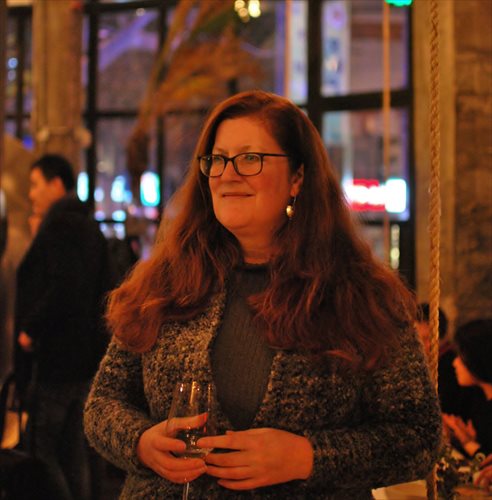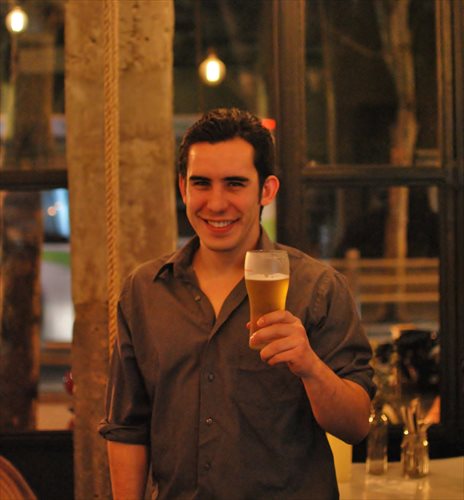HOME >> METRO SHANGHAI
Shanghai-based social entrepreneurs celebrate their unique business model’s growing popularity in China
By Wang Han Source:Global Times Published: 2016-1-18 18:28:01
Dozens of like-minded individuals from Shanghai-based social enterprises recently gathered to celebrate the first anniversary of Fresh Start Rotary Club of Shanghai, a local community for benevolent entrepreneurs and innovators.
The club stands apart for its involvement in a variety of cool yet meaningful social projects, such as sending refurbished computers to rural children, growing organic food in the downtown area and teaching baking skills to disadvantaged youth.
"As you can see, people who come here are all pretty interesting, intelligent and bighearted," Lynn King, founder and managing director of Sage Vision, told the Global Times. "They are doing exciting work, so it is an amazing place to meet people and learn from each other."
King added that their exclusive skill-sharing network, the Fresh Start Time Bank, helps facilitate the exchange of skills and resources between their members. "We all are willing to share our time, energy, knowledge and business connections," she said.
Though social enterprises are a relatively new concept in China, a growing number of expats and Chinese locals in Shanghai have been actively promoting this new business model in recent years.
"Social enterprises can be for profit or nonprofit, but it must have a social mission embedded in it, and from the very start a certain percentage of profits should go to a social cause," Angie Eagan, the current president of Fresh Start, explained to the Global Times.
She said that this model of solving social problems is more sustainable than traditional nonprofit organizations, as a social enterprise can generate profits on their own as opposed to relying on charitable donations or government funding.
Raising awareness
One new program that is being enthusiastically endorsed by Fresh Start is an initiative to promote child restraints and road safety in China. The program is led by James Feldkamp of MingJian, an independent China-based consumer organization.
"In China, 18,500 children are killed every year in traffic accidents, the number one cause of death for Chinese children under 14. These statistics come from the government blue book," assured Feldkamp. "In contrast, the number of children who died during car accidents in the UK in 2013 was only 48. That's 380 times less than in China."
Feldkamp pointed out that many vehicular deaths in China could have been prevented had the children simply been secured in a safety seat. "A good children's car seat only costs around 1,000 yuan ($151.92) (the average market price on Taobao is 300 yuan) but it could prevent 70 percent of deaths of children under the age of 7."
While only 0.7 percent of Chinese car-driving families use children's seats, around 90 percent of families in the UK and the US use child restraints. To increase the use of child restraints in Shanghai, Feldkamp and his team launched a three-step campaign.
"One is regulation, two is legislation and three is public awareness, education and training," said Feldkamp, who has been lobbying Chinese government officials to make the use of child restraints mandatory in China. His team also organizes free public events in Shanghai and Nanjing to raise parents' awareness of child restraints and how to correctly select and use children's safety seats.
Worthwhile and transformative
"A lot of young people in China fail to continue their schooling because of family or financial difficulties, so it is very hard for them to find a stable job," said Cecile Cavoizy, executive director of Shanghai Young Bakers (SYB), a charity program founded in 2008 that provides fully sponsored French bakery training to disadvantaged Chinese youth aged 17 to 23.
"In China there has been an increasing interest in Western-style bakeries, yet there is no official bakery training here," Cavoizy told the Global Times. "That is how we started the idea of setting up our French bakery training - free and exclusively to young people who are unable to continue their education." Cavoizy added that it is relatively easy for new Chinese bakers to find a job after just one year of training due to the rising demand for fresh breads and pastries in China.
In terms of how to find potential candidates for their program, Cavoizy works with NGOs in central provinces such as Shaanxi and Henan that provide basic education to disadvantaged children but do not offer employment solutions once a child completes their education. "So they recommend these young people to us, and we will interview all recommended candidates and select the most suitable for our program."
Sebastian Martin, who is expected to become the next president of Fresh Start and who also founded Shanghai's Latino-themed specialty coffee shop Cambio Coffee, said that unlike the average Chinese business that is solely concerned with maximizing profits, their club offers something worthwhile and transformative for the local community.
"We have been organizing gatherings, activities and benefits for three years, but this was our first year as a registered Rotary club," he said. "We function as a club of many individual enterprises who work closely together."



Newspaper headline: Making a difference
The club stands apart for its involvement in a variety of cool yet meaningful social projects, such as sending refurbished computers to rural children, growing organic food in the downtown area and teaching baking skills to disadvantaged youth.
"As you can see, people who come here are all pretty interesting, intelligent and bighearted," Lynn King, founder and managing director of Sage Vision, told the Global Times. "They are doing exciting work, so it is an amazing place to meet people and learn from each other."
King added that their exclusive skill-sharing network, the Fresh Start Time Bank, helps facilitate the exchange of skills and resources between their members. "We all are willing to share our time, energy, knowledge and business connections," she said.
Though social enterprises are a relatively new concept in China, a growing number of expats and Chinese locals in Shanghai have been actively promoting this new business model in recent years.
"Social enterprises can be for profit or nonprofit, but it must have a social mission embedded in it, and from the very start a certain percentage of profits should go to a social cause," Angie Eagan, the current president of Fresh Start, explained to the Global Times.
She said that this model of solving social problems is more sustainable than traditional nonprofit organizations, as a social enterprise can generate profits on their own as opposed to relying on charitable donations or government funding.
Raising awareness
One new program that is being enthusiastically endorsed by Fresh Start is an initiative to promote child restraints and road safety in China. The program is led by James Feldkamp of MingJian, an independent China-based consumer organization.
"In China, 18,500 children are killed every year in traffic accidents, the number one cause of death for Chinese children under 14. These statistics come from the government blue book," assured Feldkamp. "In contrast, the number of children who died during car accidents in the UK in 2013 was only 48. That's 380 times less than in China."
Feldkamp pointed out that many vehicular deaths in China could have been prevented had the children simply been secured in a safety seat. "A good children's car seat only costs around 1,000 yuan ($151.92) (the average market price on Taobao is 300 yuan) but it could prevent 70 percent of deaths of children under the age of 7."
While only 0.7 percent of Chinese car-driving families use children's seats, around 90 percent of families in the UK and the US use child restraints. To increase the use of child restraints in Shanghai, Feldkamp and his team launched a three-step campaign.
"One is regulation, two is legislation and three is public awareness, education and training," said Feldkamp, who has been lobbying Chinese government officials to make the use of child restraints mandatory in China. His team also organizes free public events in Shanghai and Nanjing to raise parents' awareness of child restraints and how to correctly select and use children's safety seats.
Worthwhile and transformative
"A lot of young people in China fail to continue their schooling because of family or financial difficulties, so it is very hard for them to find a stable job," said Cecile Cavoizy, executive director of Shanghai Young Bakers (SYB), a charity program founded in 2008 that provides fully sponsored French bakery training to disadvantaged Chinese youth aged 17 to 23.
"In China there has been an increasing interest in Western-style bakeries, yet there is no official bakery training here," Cavoizy told the Global Times. "That is how we started the idea of setting up our French bakery training - free and exclusively to young people who are unable to continue their education." Cavoizy added that it is relatively easy for new Chinese bakers to find a job after just one year of training due to the rising demand for fresh breads and pastries in China.
In terms of how to find potential candidates for their program, Cavoizy works with NGOs in central provinces such as Shaanxi and Henan that provide basic education to disadvantaged children but do not offer employment solutions once a child completes their education. "So they recommend these young people to us, and we will interview all recommended candidates and select the most suitable for our program."
Sebastian Martin, who is expected to become the next president of Fresh Start and who also founded Shanghai's Latino-themed specialty coffee shop Cambio Coffee, said that unlike the average Chinese business that is solely concerned with maximizing profits, their club offers something worthwhile and transformative for the local community.
"We have been organizing gatherings, activities and benefits for three years, but this was our first year as a registered Rotary club," he said. "We function as a club of many individual enterprises who work closely together."

Shanghai-based entrepreneurs celebrate the first anniversary of Fresh Start Rotary Club of Shanghai.

Angie Eagan

Sebastian Martin
Photos: Courtesy of Li Linfeng
Newspaper headline: Making a difference
Posted in: Metro Shanghai